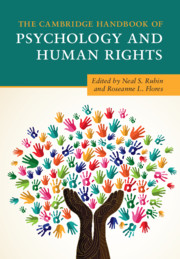Book contents
- The Cambridge Handbook of Psychology and Human Rights
- The Cambridge Handbook of Psychology and Human Rights
- Copyright page
- Dedication
- Contents
- Figures
- Tables
- Boxes
- Contributors
- Acknowledgments
- The Core International Human Rights Instruments and Their Monitoring Bodies
- Universal Human Rights Instruments
- Sustainable Development Goals
- Glossary of United Nations and Psychology Acronyms in the Handbook
- Introduction
- Part I History of Human Rights
- Part II The Intersection of Psychology and Human Rights
- 5 The Intersection of Psychology and Human Rights in Addressing Racism, Discrimination, and Xenophobia
- 6 Poverty and the Human Rights of Children and Youth through the Lenses of Psychology and Sociology
- 7 Labor Rights as Human Rights
- 8 Whose Culture? Challenging the Idea of an Opposition between Women’s Human Rights and the Right to Culture
- 9 Human Rights
- 10 Child Rights
- 11 Human Rights of Persons with Disabilities
- Part III Contemporary Issues in Psychology and Human Rights
- Part IV Teaching, Research, and Training in Psychology and Human Rights
- Part V Future Directions
- Index
- References
8 - Whose Culture? Challenging the Idea of an Opposition between Women’s Human Rights and the Right to Culture
from Part II - The Intersection of Psychology and Human Rights
Published online by Cambridge University Press: 02 October 2020
- The Cambridge Handbook of Psychology and Human Rights
- The Cambridge Handbook of Psychology and Human Rights
- Copyright page
- Dedication
- Contents
- Figures
- Tables
- Boxes
- Contributors
- Acknowledgments
- The Core International Human Rights Instruments and Their Monitoring Bodies
- Universal Human Rights Instruments
- Sustainable Development Goals
- Glossary of United Nations and Psychology Acronyms in the Handbook
- Introduction
- Part I History of Human Rights
- Part II The Intersection of Psychology and Human Rights
- 5 The Intersection of Psychology and Human Rights in Addressing Racism, Discrimination, and Xenophobia
- 6 Poverty and the Human Rights of Children and Youth through the Lenses of Psychology and Sociology
- 7 Labor Rights as Human Rights
- 8 Whose Culture? Challenging the Idea of an Opposition between Women’s Human Rights and the Right to Culture
- 9 Human Rights
- 10 Child Rights
- 11 Human Rights of Persons with Disabilities
- Part III Contemporary Issues in Psychology and Human Rights
- Part IV Teaching, Research, and Training in Psychology and Human Rights
- Part V Future Directions
- Index
- References
Summary
We challenge the idea that the human rights of women and the right to culture are in opposition. First, the ideas that all human beings have the same rights and that these rights cannot be selectively abridged are fundamental to a diversity of cultures – though they often co-exist with discriminatory ideas and practices. Second, the idea of opposition between women’s rights and cultural rights is grounded in the myth that cultures are homogenous, bounded, and static. All cultures include a diversity of values; cultures also constantly mix and evolve. Third, the idea of opposition between women’s rights and cultural rights overlooks the power dynamics that make it difficult for women to influence their culture. Fourth, contraposing women’s rights and cultural rights splits experiences of oppression and privilege by gender and culture, instead of recognizing their intersectionality. Finally, the selective use of arguments against the universality of human rights in women’s case reveals bias. The universality of human rights is not questioned when men’s rights are at stake. In conclusion, it is critical to recognize and resist oppressive interests and practices disguised under the cloak of culture. The universality-of-human-rights principle demands essential protections and freedoms for all human beings.
Keywords
- Type
- Chapter
- Information
- The Cambridge Handbook of Psychology and Human Rights , pp. 121 - 134Publisher: Cambridge University PressPrint publication year: 2020

